My child is too small yet, how will she/he help me with the household chores??
Why do I need to include my kid in the household work when it can be done by me or the house help??
What will be the benefits of doing chores for kids? They should only be playing at this age!
Shouldn’t the kids be just kids, for the little while they are??
Isn’t it a common notion among parents? Yes, it is….
We as parents get too protective of our kids and think that it is either not required or it will be too much of a burden on them if we include them in the household chores.
But surprisingly, it is not the scenario, and kids enjoy it and feel very happy and excited to participate in it, making it a game. Anything for them can be a game if it is not pressured on them.
Benefits of Doing Chores for Kids
1. A sense of Responsibility
Doing your work should never be a burden. And teaching this at a young age is what is needed. We as parents think asking kids to do their work can be a burden on them and might traumatise their childhood. But it is not true.
Asking kids to do their routine work like picking up their utensils after eating, hanging their towel after bath, taking out their clothes before bath, keeping the toys in place, etc, can benefit them in the long run. And moral values should start early. Don’t wait for them to grow up to be responsible. Make them responsible early in life, and they would be calm and composed.
My 7-year-old packs her bag for school, for swimming or any activity she does, and rarely forgets anything at home. She enjoys it and asks me not to do it for her. This is being responsible. I am never worried if she will leave anything or miss out on something. Her brain is active when she is doing it, she is focused, and her memory improves as she knows she doesn't have to miss out on anything. This helps her in day-to-day life. Not just packing her bag, but for many other things too, she takes responsibility and is quick to act. So, yes, I am very proud of her!!
Having a sense of responsibility to do a task is one of the most important things needed in life. Be it a girl or a boy, it is very important to understand that it is an individual’s responsibility to do his or her work, and not wait for someone else to do it.
Giving them the household chores will help them understand that they should be responsible for their work, and they should not (not can not) depend on someone else.
2. A Sense of Content
When kids complete even the simplest chore, like folding their clothes, setting the table, or watering the plants, they feel a quiet sense of contentment. This small achievement boosts their self-esteem because they can see the results of their effort right away.
For example, a 6-year-old who helps put away toys after playtime looks around at the clean room and feels proud that they made it happen. This feeling of “I did it myself” plants the seeds of confidence and independence.
Over time, these little victories add up. Children begin to connect the dots between effort and outcome, learning that their contributions matter not just to themselves but to the entire family. This sense of accomplishment motivates them to take on more responsibilities and builds a positive attitude toward work in general.
In short, chores aren’t just about getting household tasks done; they give kids a deep, lasting sense of contentment that shapes their personality and outlook.
3. It Teaches Kids Teamwork
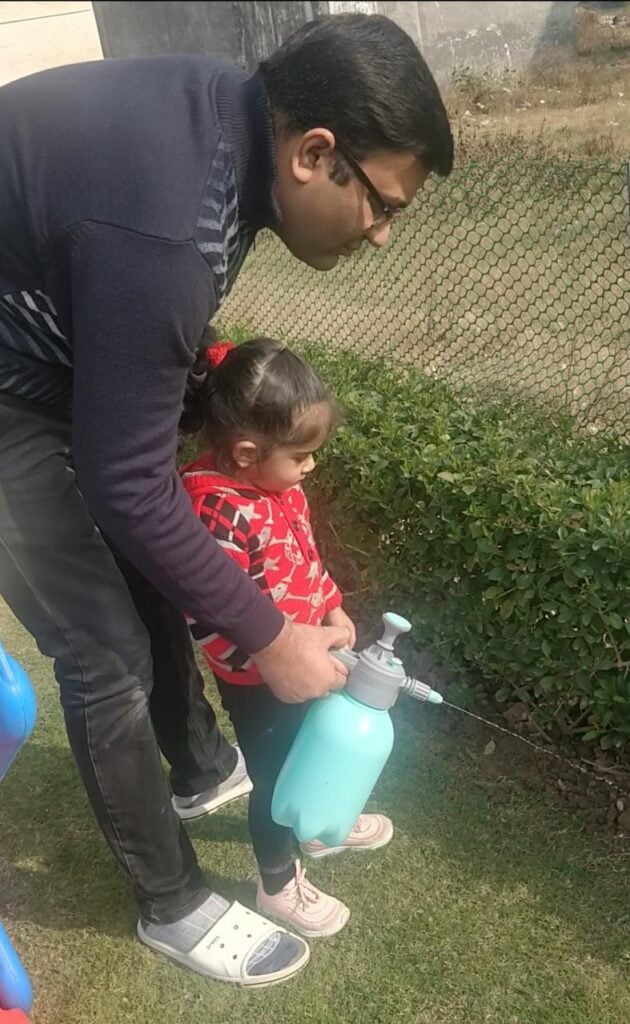
A family that works together, stays together.
Chores are one of the simplest ways to help children understand the power of working together as a team. When kids share household responsibilities, like clearing the table, helping a sibling fold laundry, or assisting a parent in cooking, they see firsthand that everyone’s effort contributes to the bigger picture.
This experience teaches them that they are part of a family unit where cooperation matters. They learn to listen, coordinate, and compromise, just like they will need to do later in school projects, sports, or their future workplaces.
By practising teamwork at home, children also build empathy. They start recognising how their actions make life easier for others. Over time, chores transform from “just a duty” into an opportunity to feel connected, responsible, and valued within the family.
Chores teach kids that teamwork is not about who does more, it’s about doing it together.
4. Helps In Spending More time as a Family Together
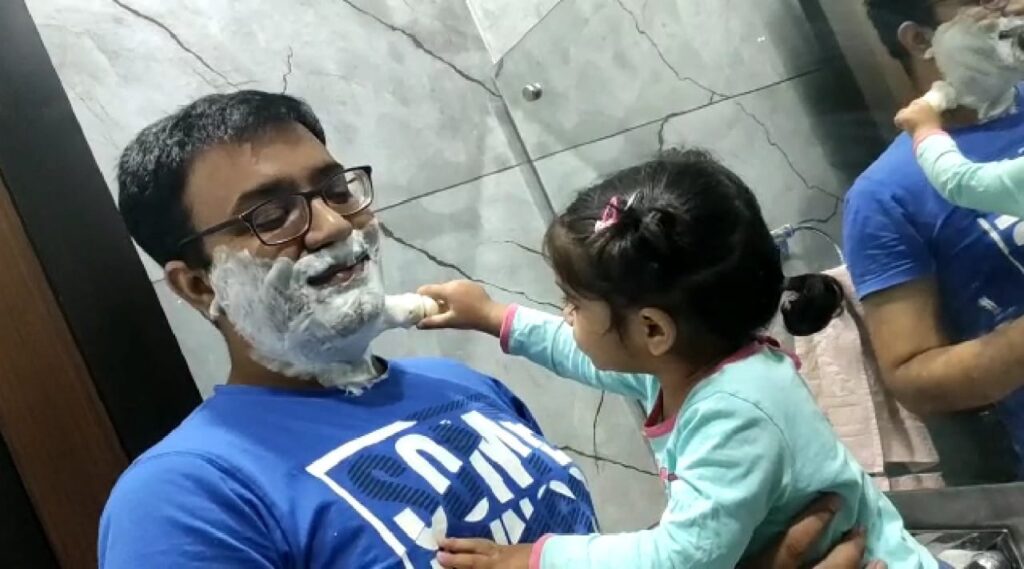
In today’s world, it has become very hard for families to spend quality time together. This is the reason the kids are not very close to their parents, and an uninvolved parenting style is being followed more often. Doing chores together helps you connect. The child will ask you questions, and you will answer them. You will teach the child something new every time you are together. It will be fun for both of you.
When parents and kids work side by side, whether it’s cooking dinner, folding laundry, or cleaning the garden, it naturally opens up space for conversations, laughter, and teamwork. These shared tasks become bonding moments, where children not only learn important skills but also feel that they are a valuable part of the family.
It also helps in teaching cooperation to the child and teamwork. It is not important to plan something new each day to teach kids life lessons. It can be done by including them in small chores around the house. Also, the workload is shared. Simple chores like setting the table, watering the plants, etc., can help.
Over time, these little interactions strengthen relationships and create warm memories. Chores stop being just “work” and start becoming opportunities to enjoy each other’s company, making the home a place of teamwork, love, and togetherness.
5. Learning Skills
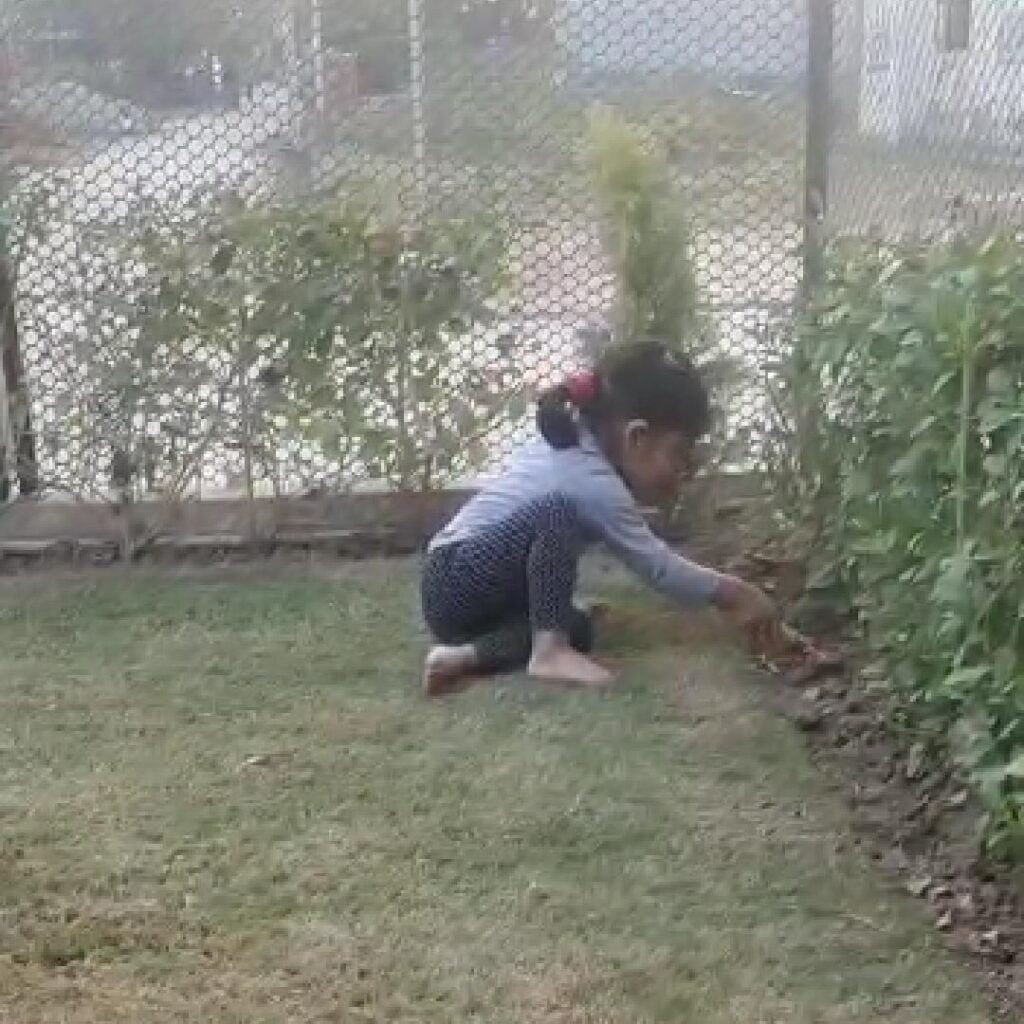
As I always say, the sooner the better.
They need to learn certain skills in life, and doing household chores is one of the basic skills that they should be learning. Then why not start when they are young, and they want to get involved in everything by themselves?
It is just that we adults consider household chores as something big and something difficult. We look at it as a task we need to complete. For the kids, it’s just some fun and playtime. My little one comes to me and asks me if she can make a few small chapatis. This is because it is fun for her.
Also, learning this very important life skill early in life will give them a sense of confidence and help them to live better in later situations when they need to move out of the house when they are grown up, or when they need to go out for higher studies.
6. Respecting others
Many times, I have heard parents say, “I get up early in the morning and finish off all my work before my kid even gets up.” To this, I would say, why??
It is agreeable till the time your kid is very small and you have to devote your 100% time to your child. But once he or she starts understanding things, and starts crawling or walking, why do you need to get up early or use the nap times to cook, clean or do the laundry?? If the child always sees the house spick and span, the child will not understand that it needs effort and cleaning. The child needs to see you cleaning the house, cooking food and doing the laundry. The child should see how hard you are working for it.
So, doing the household chores in front of your child will help in understanding that there is someone who has been spending a lot of time keeping it the way it is, and eventually, he or she will start participating in the work with you and respecting you for what you are doing for the home. My daughter comes to me every Sunday and asks me if she can be my little assistant.
My daughter was just a year old when I started involving her with me to start sorting out the laundry. She used to let me fold a heap of laundry, and she would start playing with the socks or the handkerchiefs. She was just 1.5 years old when she started serving chapatis, keeping the dishes, and helping us make the bed.
And now doing the household chores is her way of helping us and expressing her love.
7. Keeps them Occupied
Parents are struggling to find healthy and productive ways to keep their children occupied. With the increase in screens and gadgets, kids spend hours watching TV or playing video games. The child is not responsible for this, but the parents are. Involving the child in chores at home offers a positive alternative and keeps them busy away from the screens.
When children are engaged in age-appropriate tasks, like watering plants, helping in the kitchen, or tidying up their toys, they stay meaningfully occupied. These small responsibilities give them a sense of purpose and accomplishment, reducing boredom and discouraging unhealthy habits. It keeps their minds and hands active while fostering independence and problem-solving skills.
Most importantly, chores help children realise that they are trusted and capable of handling responsibilities. This boosts their confidence while giving parents peace of mind, knowing their kids are productively engaged. A busy child is not just occupied; they are learning, growing, and building the foundation for a more responsible future.
8. Helps to improve the fine and gross motor skills
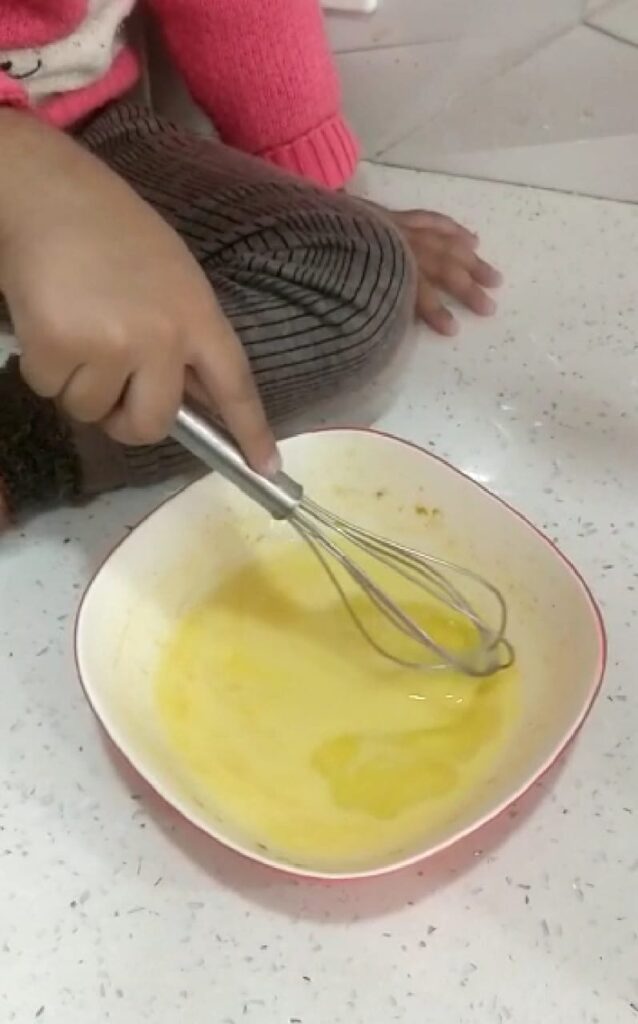
Fine motor skills involve the small muscles of the hands and the wrist, and gross motor skills involve the larger muscles of the arms and the legs. Helping you around in the household chores also helps them in making their fine as well their gross motor skills better. It also improves their hand-eye coordination.
e.g. You ask your child to fill your sugar container with the sugar in a big storage box from the pantry, this will help them to focus more and coordinate their hands and eyes and try making the minimum spills. This will further help in increasing the concentration. You can ask them to beat eggs, roll the dough, transfer the pulses, etc.
The memory, the grasp, and the handling of things get better with time. The chores will involve pushing, pulling, grasping, and many other things, which will further help. And don’t worry about the spillage. It will happen, and you will have to clean it the first few times. And it is okay!!
9. Developing Organisation Skills
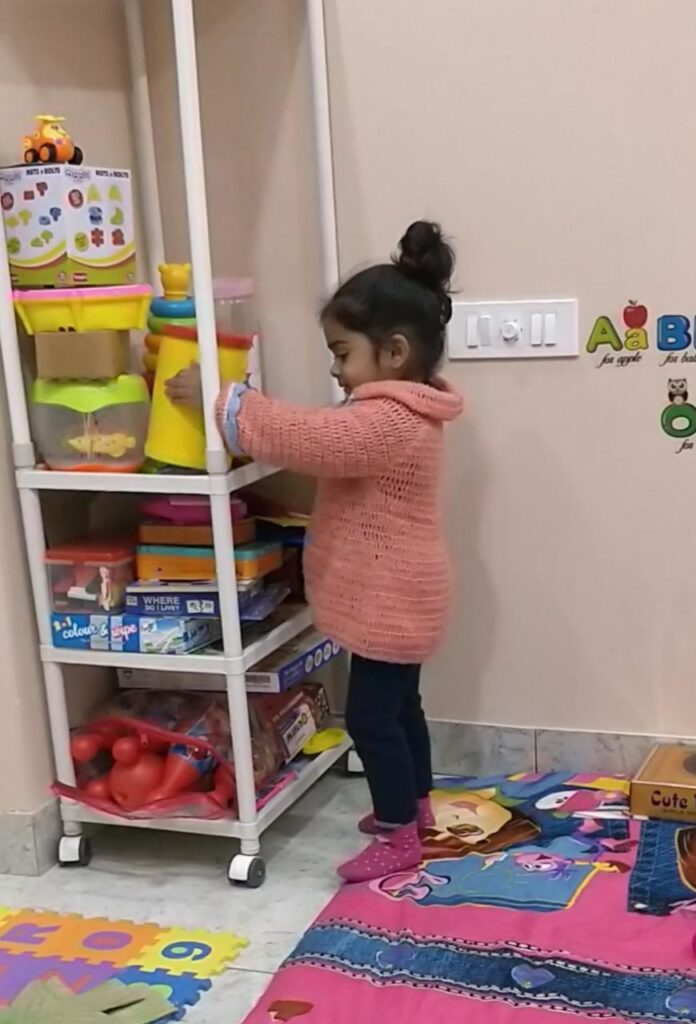
Tell them where to keep what (the smaller things, of course), and they will remember it. It might take a day or two, and you might need to tell them a few times, but it is definitely going to work.
Tell one thing at a time, “keep your books in your bookshelf”.
Wait for them to do it.
Then keep your toys in the basket.
Again, wait for them to do it.
Next, keep your clothes in the cupboard.
This way, they will understand better.
If you tell them everything together, they will get confused and leave everything where it was.
This will help them in organising their rooms when they grow up, and this will for sure help you in reducing your work as well as help them in learning to do their work themselves.
This will also help them be more organised once they go on school trips, science fairs, and other places they might need to be.
10. Reduces your workload
Last but not least, it will reduce your workload.
Maybe not in the beginning, but over time, it will help you reduce your work overload. In the beginning, you might need to teach them a few times; they might make a bigger mess, and may get distracted. But it is part of the journey. Eventually, they will start doing their own work on their own, like packing their bags, arranging their clothes, keeping their books and toys back, etc. It looks like nothing, but actually, it takes a lot of time. So, this reduces your workload.
For example, while cleaning, I ask my daughter to keep all her stuff in place. Meanwhile, when she is keeping her things at various places in the room, I finish off some other work I need to do, which I can not take her help with. So it works fine and quickly for us.
They will slowly start doing more of your work, and it won’t be a burden for them at all, but a habit.
There are certain things that school can not teach and as parents it is our responsibility to teach our kids. Including them in the household chores will help not only them but everyone as a family and this will surely help them in leading a better future as they might be learning a lot of things when they are young.
Happy Parenting!
FAQ’s
At what age should children start doing chores?
Children can start doing age-appropriate chores like putting clothes in the basket, picking up their toys and books, etc., as early as 2-3 years of age. Later, as the child grows, they can start helping more at home. Like, in the kitchen, putting the vegetables and fruits in the fridge, serving food, pouring sugar in containers, etc. They can start helping by folding laundry, helping doing dusting, arranging their cupboard, once they have grown up a bit. The chores they do should be fun for them and keep them involved.
How do chores benefit children?
Chores teach kids responsibility, teamwork, time management, and essential life skills. They also build confidence and strengthen family bonding. Chores help them learn how to live life once they grow up.
Should chores be linked to pocket money?
Many parents link chores to pocket money or an allowance, which I personally believe should not be the case. Chores are more about responsibilities and teamwork, and not about getting paid to do the work. So, no, chores should not be linked to pocket money.
How can I motivate my child to do chores without nagging?
Turn chores into a routine, give choices, work together, and use positive reinforcement instead of punishment. Help the child in whatever the child is doing. Guide them step by step. Start early. If you suddenly ask a 10-year-old to clean his or her room, it is not happening.





By including kids in household duties,not only we will enhance their confidence but also teach them how to be selfdependent.Beautiful article!
Very interesting 😀, schools are closed, these activities will teach the kids a sence of responsibility and will also help them ro learn the activities , mostly taught practically, in most of the good preschools….